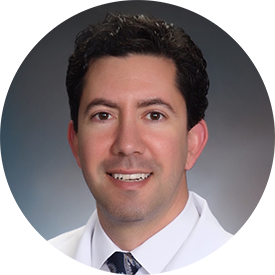
Adrian Epstein, MD, a second year fellow in the Division of Neonatology, was recently awarded the 2021 Marshall Klaus Neonatal-Perinatal Research Award for his project, mentored by Eric J. Benner, MD, PhD, George W. Brumley Jr. MD Distinguished Assistant Professor of Developmental Biology, entitled, Disruption of oligodendrogenesis following sepsis-induced injury to the postnatal subventricular zone.
Epstein’s project was selected from a highly competitive group of applicants, who were reviewed by the Section on Neonatal-Perinatal Medicine (SoNPM) Research Committee, composed of seven senior academic neonatologists. The award will be formally acknowledged at the next AAP National Conference & Exhibition (NCE) meeting in Philadelphia, PA on October 8 -10, 2021.
Project description
Preterm neonates are at high risk of brain injury leading to impairments in motor, cognitive and behavior development. Prematurity-specific mechanisms of neonatal neurological disease are not well defined, and no therapies are available at this time. The subventricular zone (SVZ) is part of the germinal matrix and critical for postnatal brain development. The SVZ neural stem cell niche includes ciliated ependymal cells that form a barrier between the cerebral spinal fluid and neural stem cells, as well as paracrine regulation of stem cell activity. Progenitor cells from the SVZ contribute to growth of white matter and the cerebral cortex beyond infancy and through childhood. This proposal aims to test the hypothesis that injury to cells in the SVZ interfere with brain development. Our laboratory has developed a clinically relevant rodent model where experimental bowel perforation leading to neonatal sepsis replicates brain injuries seen among preterm-born infants. These injuries include white matter injury as well as motor deficits. Preliminary evidence shows that systemic bacterial sepsis leads to neuroinflammation in the SVZ with robust microglial activation. Moreover, we have observed a novel injury to the ependymal layer of the SVZ along the lateral ventricular wall. In this research proposal we will measure neural stem cell responses to neonatal experimental bowel perforation and sepsis in the animal model. We plan to combine cell isolation techniques with transcriptomics and immunofluorescence to measure specific changes in SVZ ependymal, glial, and neural stem cells in septic compared to littermate control animals. Next, we will determine the functional impact of SVZ injury on postnatal brain development using genetic lineage tracing of SVZ progenitor cells to demonstrate and measure the outcome of SVZ injury on brain development compared to littermate controls. The results of this investigation into SVZ pathobiology will generate a novel mechanism of brain injury unique to premature birth that may impact how we implement neuroprotection and diagnose early brain injury. Such discoveries may expand the repertoire of therapeutic possibilities and capacity for developmental recovery for babies born prematurely.
The overarching goal of my program of research is to improve neuroprotective care for preterm neonates. --Adrian Epstein, MD
Personal statement
"The overarching goal of my program of research is to improve neuroprotective care for preterm neonates. During my third year of neonatology fellowship at Duke University, my training will focus on neurobiology related to neonatal clinical problems. My research mentor, Eric Benner develops neural stem cell therapies using a neonatal mouse model of experimental peritonitis where systemic polymicrobial infection leads to diffuse white matter injury. We found that the germinal matrix at the subventricular zone (SVZ) displays a degenerative phenotype with reduced activity of neural progenitor cells following severe sepsis in the animal model. Currently there are no therapies for preterm neonatal brain injuries, however, with the support of the Marshall Klaus Neonatal-Perinatal Research Award, we will investigate neural stem cell responses to systemic inflammation during the sensitive period of neural progenitor cell development. Discoveries of novel mechanisms of injury unique to premature infants will, hopefully, strengthen translational research to improve neurodevelopmental outcomes. To complete the aims of this project, I will have the opportunity to work with influential collaborating scientists at Duke using advanced techniques in neuroimmunology and molecular neuroscience. I am also currently supported by the Unified Program for Therapeutics in Children (UPTiC), a T32 training program mentored by pediatric physician scientists across Duke University and the University of North Carolina, Chapel Hill. My long-term goal is to practice as a neonatologist-neuroscientist – to improve developmental outcomes using neurorestorative therapies for infants in the NICU."
About the Marshall Klaus Neonatal-Perinatal Research Award
The Marshall Klaus Neonatal-Perinatal Research Award, initiated by the American Academy of Pediatrics (AAP) Section on Neonatal-Perinatal Medicine and Johnson & Johnson Pediatric Institute, provides financial support to assist outstanding fellows in initiating or completing their research projects.
As a pioneer in neonatology, Dr. Marshall H. Klaus has made many seminal discoveries in surfactant biology, but he may be best known for his leadership in the humane care of mothers and infants and promoted the term “maternal infant bonding” in the neonatal intensive care unit (NICU). Dr. Klaus mentored numerous leaders—past and current—in neonatology and continues to make a significant impact in the academic development of physicians training in neonatal-perinatal medicine through this award in his name.
The Klaus Award has directly contributed to over 40 publications by trainees in neonatal-perinatal medicine fostering interest in academic neonatology to ensure that scientific and medical progress for our most vulnerable patients continue.